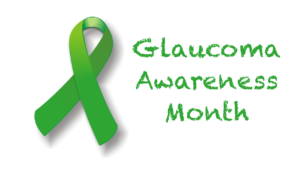Glaucoma Awareness Month


- Definition
- Diagnosis
- Risk factors
- Treatment options
What is Glaucoma?
Glaucoma is a leading cause of blindness world wide. The disease is often “silent,” in that there are often no signs or symptoms until late in the disease.
There are many types of this blinding disease. “Open angle” glaucoma is the most common in the United States, whereas “narrow angle” is more common in asian countries.
Symptoms are few, but may involve loss of peripheral vision with loss of central vision in the late advanced stages. With early detection and before noticeable vision loss occurs, it can often be controlled and vision loss may be prevented.
Diagnosis
When evaluating our patients for this disease, we routinely obtain the intraocular pressure (IOP) of each eye. The IOP can be correlated with glaucoma…the higher the eye pressure, the higher the chance of having the disease.
During a comprehensive eye examination, there is usually not one single finding which allows us to make the diagnosis. Eye pressure is just one variable we consider when making the diagnosis. It may be considered a risk factor for the disease.
Other findings which suggest glaucoma include;
- Health or appearance of the optic nerve
- Intraocular pressure (IOP)
- Thickness of the nerve fiber layer
- Visual field – affects your peripheral vision before central vision
Risk Factors
In general, the risk of developing glaucoma increases as we age. You might also be more likely to develop it if you have the following risk factors:
- African Americans > age 40
- > 60 years old, especially in Latino and Hispanic families
- Positive family history
- Asian or farsighted individuals
Treatment of Glaucoma
Depending upon the type of glaucoma, there are many treatment options. Eye drops are commonly used to reduce the IOP. Certain types of glaucoma respond to particular types of laser. There are surgical options which are often needed when medications and/or laser do not control the glaucoma.
What Can You Do?
Talk with your friends or family. Share this article with people who may be at risk or who have family members with the disease.
Glaucoma awareness is only successful if every one makes a concerted effort to educate one another with the goal of diagnosing and treating those at risk.
We look forward to seeing you. If you would like to make an appointment or if you have questions about glaucoma, please call us.
Gregory Scimeca, M.D.
Ophthalmologist and Medical Director
Burlington County Eye Physicians
Eye Professionals, LLC (Millville, NJ)
Eye Physicians and Surgeons of Bucks County (Langhorne, PA)
